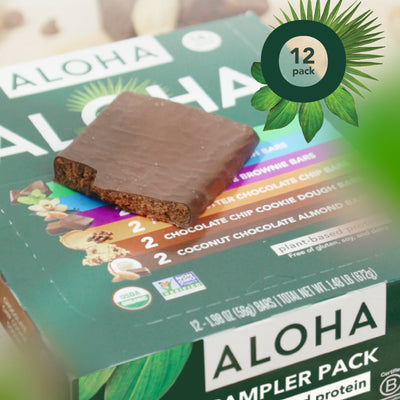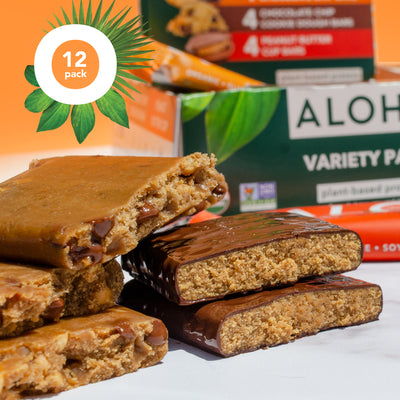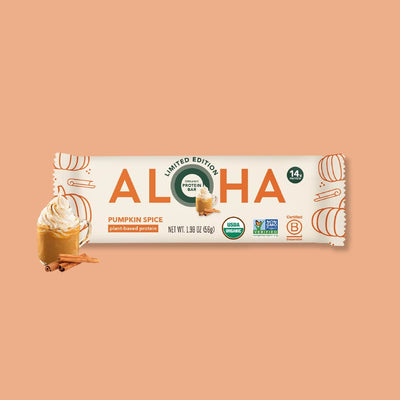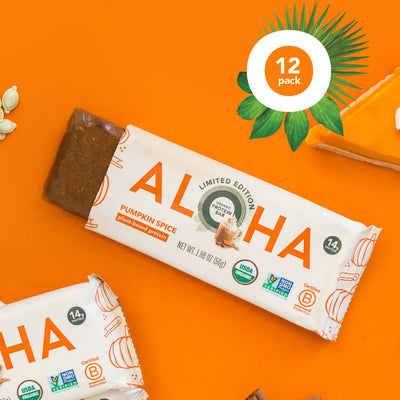Key Takeaways:
- Digestibility: Pea protein is naturally soy-free and dairy-free, making it easier on the stomach for people with sensitivities.
- Sustainability: Plant-based protein like pea has a lower environmental impact compared to dairy-based whey protein.
- Lifestyle Fit: Pea protein aligns with plant-based, vegan, and allergen-conscious lifestyles, while whey suits high-intensity fitness routines.
At ALOHA, we don’t just make protein — we make it better. As a Certified B Corp, we're proud to be employee-owned, plant-forward, and fully committed to doing things the right way — for people and the planet. From clean, organic ingredients to products that are always soy-free, we’ve built our name on making wellness more accessible, sustainable, and delicious. We know what goes into your protein matters, and we don’t cut corners.
When it comes to choosing between pea protein and whey protein, the decision can feel overwhelming — especially with so many opinions out there. Each offers unique benefits, and both support your protein needs in different ways. But beyond the basics, there are deeper differences: how they’re sourced, how they feel in your body, and how they align with your values. That’s where things get interesting.
In this piece, we’ll be discussing the key differences between pea protein and whey, what benefits each brings to the table, and how to choose what works best for your lifestyle — naturally, with ALOHA’s plant-based perspective.
Understanding The Basics: What Is Pea Protein? What Is Whey?
When it comes to getting enough protein, most people turn to either plant-based or animal-based options. Two of the most popular choices? Pea protein and whey protein.
Pea protein is made from yellow split peas. It’s a plant-based, dairy-free source of protein that’s also soy-free — a big plus for anyone with allergies or dietary preferences. It’s known for being gentle on digestion and packed with essential amino acids, especially those that help with muscle recovery.
Whey protein comes from milk. It’s what’s left over during the cheese-making process, and it’s been a go-to for athletes and fitness enthusiasts for decades. While it’s effective in building muscle, it may not sit well with those who are lactose intolerant or looking for a plant-based lifestyle.
Both types of protein do the job — they help fuel your body, support recovery, and keep you feeling full — but how they do it, and how your body responds, can differ.
Key Differences Between Pea Protein And Whey Protein
While both pea and whey protein offer a solid boost of nutrition, they come from different sources and suit different lifestyles. Here’s how they compare:
Source
Pea protein is entirely plant-based, made from yellow peas — ideal for vegans, vegetarians, or anyone leaning toward a more sustainable diet. Whey protein, on the other hand, comes from dairy, which may not work for those avoiding animal products.
Digestibility
Pea protein is generally easy on the stomach and free from common allergens like soy and lactose. Whey can cause bloating or discomfort in people who are lactose intolerant.
Nutrient Profile
Whey contains all nine essential amino acids and is naturally high in leucine, which helps stimulate muscle growth. Pea protein is also rich in essential amino acids, including branched-chain amino acids (BCAAs), but in slightly different ratios. Both support muscle recovery, just in different ways.
Environmental Impact
Pea protein tends to have a smaller environmental footprint. It's made from plants that require less water and fewer resources than dairy-based products — a choice that’s better for the planet.
Dietary Preferences
If you're looking for a dairy-free, soy-free, or vegan-friendly option, pea protein is the clear winner. It fits seamlessly into most dietary lifestyles without compromise.
Benefits Of Pea Protein
Choosing a plant-based protein doesn’t mean sacrificing performance or nutrition. In fact, pea protein offers several unique benefits that make it a strong choice for everyday wellness:
Gentle On Digestion
Pea protein is naturally soy-free and dairy-free, making it easier for many people to digest. If you’ve ever felt bloated or sluggish after a protein shake, switching to pea protein could make a big difference.
Supports Muscle Recovery
Pea protein contains all nine essential amino acids, including BCAAs (branched-chain amino acids), which are important for muscle repair. It gives your body what it needs to recover after movement — no matter your fitness level.
Plant-Powered Energy
Since it’s derived from yellow peas, pea protein brings the benefits of plants without the heaviness of dairy. That means more natural energy and less of that weighed-down feeling.
Better For The Planet
Peas are a low-impact crop, requiring less water and fewer resources to grow. Choosing pea protein helps support a more sustainable food system — a simple way to do something good for your body and the earth.
Naturally Soy-Free, Always
At ALOHA, we believe in clean, simple ingredients. That’s why all of our protein products — including our Vanilla Protein Shake, Chocolate Sea Salt Protein Shake, and Coconut Protein Shake — are made with organic pea protein and are completely soy-free.
Benefits Of Whey Protein
Whey protein has been a popular go-to for years — especially among athletes and those focused on muscle-building. While it’s not plant-based, it still offers a few solid benefits depending on your needs:
Quick Absorption
Whey is known for its fast-digesting nature. That means it gets to work quickly after a workout, helping support muscle repair and recovery soon after you finish exercising.
Complete Amino Acid Profile
Whey contains all nine essential amino acids and is particularly high in leucine, which plays a key role in muscle growth and repair. For those doing high-intensity workouts or strength training, this can be a major plus.
Proven Track Record
Whey has been studied and used for decades, and many people have found it effective. If dairy works well for your body and you're not following a plant-based lifestyle, whey can be a reliable option.
Which One Is Better For You?
The truth is, it depends on your lifestyle and what feels good for your body. Both pea protein and whey protein offer high-quality nutrition, but the best choice comes down to what works for you.
If you’re looking for something plant-based, soy-free, and easy to digest, pea protein is likely the better fit. It’s also a great choice if you care about making environmentally responsible food decisions. ALOHA’s protein products check all these boxes — with clean ingredients you can trust.
On the other hand, if you don’t have issues with dairy and want something with a long history in the fitness world, whey protein might suit your needs — especially for those with high protein demands from heavy training.
But there’s no single “right” answer. The key is to choose something that supports your energy, recovery, and overall well-being — without compromising your values or comfort.
How ALOHA Supports Your Protein Goals
At ALOHA, we believe that good nutrition should feel simple, satisfying, and aligned with your values. That’s why all of our protein shakes are made with organic, plant-based ingredients, including pea protein — a source that’s gentle on the body and better for the planet.
Here’s what sets ALOHA apart:
Plant-Based And Soy-Free
Every ALOHA protein shake is crafted with organic pea protein and is always soy-free, making it a smart choice for those with dietary restrictions or anyone choosing a more plant-forward path.
Better Ingredients, Better Impact
We care about how our products affect people and the planet. That’s why we’re proud to be a Certified B Corp and employee-owned — committed to doing business in a way that helps communities thrive and keeps the planet in mind.
Convenient And Delicious Options
Whether you’re heading to work, finishing a workout, or just need a clean snack on the go, ALOHA shakes make it easy. Try our Vanilla Protein Shake, Chocolate Sea Salt Protein Shake, or tropical-inspired Coconut Protein Shake — all packed with protein and flavor, no compromise needed.
Looking To learn more?
Check out our helpful guides on protein powder vs protein shake or creatine vs protein powder if you’re exploring your options.
Final Thoughts
Whether you choose pea protein or whey protein, the goal is the same: to fuel your body with something that supports your day, your movement, and your well-being. It’s not about picking the “right” one — it’s about picking the one that feels right for you.
At ALOHA, we believe in keeping it simple, using good ingredients, and staying true to values that support both people and the planet. That’s why our plant-based, soy-free protein shakes are designed to help you feel good — from the inside out.
If you’re looking for clean, convenient protein made with care, we’ve got you. Explore our flavors and find the one that best fits your lifestyle: Vanilla Protein Shake, Chocolate Sea Salt Protein Shake, or Coconut Protein Shake. You’ve got options, and with ALOHA, they all feel good.
Read also:
- Benefits Of Superfoods: Why They Boost Your Health
- Superfood Recipes: Easy And Healthy Meal Ideas
- How Long Does Protein Stay In Your System? Key Facts
Frequently Asked Questions About Pea Protein Vs Whey
What does pea protein taste like compared to whey protein?
Pea protein has a mild, slightly earthy taste that blends well with natural flavors like vanilla or chocolate. Whey protein is creamier and often has a dairy-forward flavor.
Can you cook or bake with pea protein like you can with whey?
Yes! Pea protein holds up well in recipes like pancakes, muffins, or energy balls. It doesn’t denature the way whey might when exposed to high heat.
Is pea protein hypoallergenic?
Pea protein is naturally free from common allergens like dairy, soy, and gluten, making it a smart choice for people with food sensitivities.
How is the texture of pea protein shakes different from whey shakes?
Pea protein shakes can feel slightly thicker or grainier depending on the blend, while whey shakes tend to be smoother and more fluid in consistency.
Does pea protein cause bloating?
Many people find that pea protein causes less bloating than whey, especially if they are lactose-sensitive. It's gentler on the digestive system for most.
Is pea protein suitable for kids or teens?
Yes, in general — pea protein is a clean, plant-based option that’s safe for most age groups. But it’s always best to check with a healthcare provider for specific needs.
How sustainable is pea protein farming compared to dairy farming?
Pea farming uses less water and produces fewer greenhouse gases than dairy farming, making it a more eco-conscious protein choice.
Can I use both pea protein and whey protein in my routine?
Absolutely. Some people blend both to benefit from different amino acid profiles or switch depending on their meal, workout, or digestion needs.
Does pea protein support weight management?
Pea protein is high in fiber and protein, which may help support fullness and reduce unnecessary snacking — though it should never be marketed as a weight-loss tool.
Is there a difference in shelf life between the two?
Pea protein generally has a longer shelf life than whey, especially when stored properly, since it’s plant-based and less prone to spoilage.












